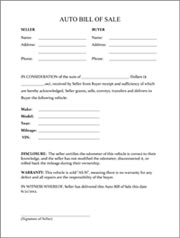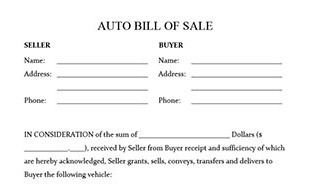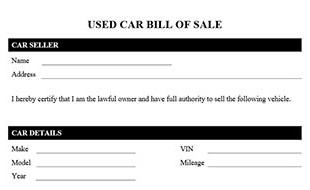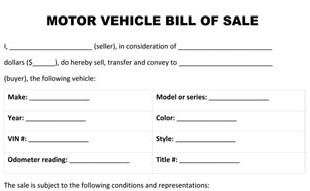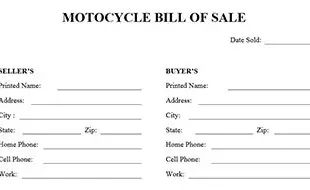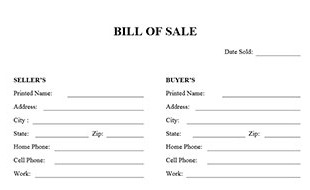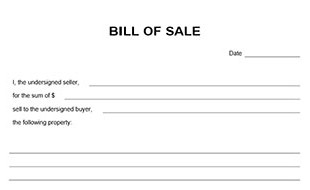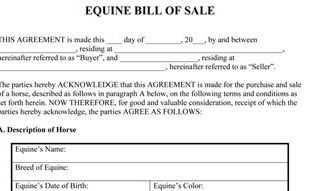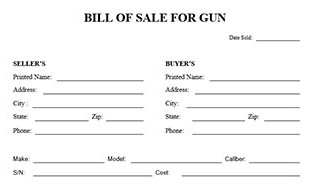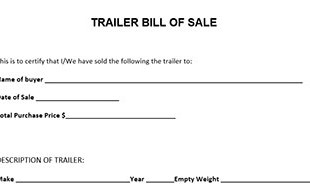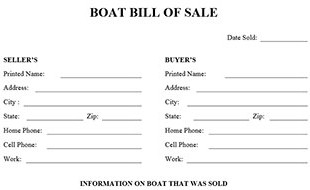Welcome to the bill of sale form website! We have every bill of sale you need to speed up the paperwork in your private sales and protect you from future disputes.
We provide you with automobile bills of sale, motorcycle bills of sale, used car bills of sale, boat bills of sale, and many more to help you create a bill of sale accurately, quickly, and efficiently.
A bill of sale is a legal document issued by you as a seller to a buyer to record that on a given date, at a specific place, you transfer the title of personal property, e.g., used car, boat, trailer, etc., to the buyer for a total amount of money.
Many states in the U.S. provide you with a state-approved bill of sale on their official Department of Motor Vehicles (DMV) websites. However, rather than browsing the internet to find the form or driving to the local Department of Motor Vehicles (DMV) office to grab one, you can quickly download a printable bill of sale form directly from our website.
If your state doesn’t provide a bill of sale for a specific personal property, don’t worry. We have a general bill of sale form or blank bill of sale that helps you create a bill of sale for any specific item.
Information on a bill of sale
A typical bill of sale outlines the following information:
- Names of both buyer and seller
- Complete addresses of both buyer and seller, including street address, city, state, zip, and phone; notice that P.O. boxes are not acceptable in a bill of sale.
- Information on the personal property that is being transferred. It depends on the item, e.g., a used car, a motorcycle, a boat, a trailer, etc. The corresponding bill of sale must provide the respective information. For example, a bill of sale for a used car must provide the following details: make, model, year, vehicle identification number (VIN), and odometer reading at the time of sale.
- The purchase price must be written down in numbers and sometimes words.
- Date of sale.
- If an item is sold “as-is without warranties,” the seller does not guarantee the buyer’s quality. It also means that the seller is not liable for any flaws or imperfections in the sold item. The bill of sale must contain a sentence that specifies that the item is sold AS-IS.
- The signatures of both seller and buyer. Some states in the U.S. require a bill of sale to have a notary public seal to identify the seller and their signature.
Benefits of a bill of sale
A bill of sale makes the transfer of personal property legal for both buyers and sellers.
For sellers
- The “AS IS” term on the bill of sale protects you if the item you sold has any problems or defects after the sale transaction. It means you, as the seller, are not responsible for any damages to the item.
- A bill of sale is evidence of a transfer of ownership that is sometimes critical. For example, if you sold a firearm, and it is associated with a crime, a signed gun bill of sale is used as supportive evidence that you were not the firearm owner when the crime happened.
- A bill of sale is a supporting document as part of your tax documents. In addition, you can use a bill of sale for your accounting purposes.
For Buyers
- A bill of sale is proof of ownership of a personal asset. This allows others to verify your rights to the personal property. For example, when you register a used car at the DMV or submit your total asset value for a bank loan, the used car bill of sale form serves as proof of ownership.
- A bill of sale specifies the total amount and the date of ownership, which helps prevent any possible disputes when the item is transferred.
Welcome to the bill of sale form website! We have every bill of sale you need to speed up the paperwork in your private sales and protect you from future disputes.
We provide you with automobile bill of sale, motorcycle bill of sale, used car bill of sale, boat bill of sale, and many more to help you create a bill of sale accurately, fast, and easily.
A bill of sale is a legal document issued by you as a seller to a buyer to record that on a given date, at a specific place, you transfer the title of personal property, e.g., used car, boat, trailer, etc., to the buyer for a total amount of money.
Many states in the U.S. provide you with a state-approved bill of sale on their official Department of Motor Vehicles (DMV) websites. However, rather than browsing the internet to find the form or driving to the local Department of Motor Vehicles (DMV) office to grab one, you can quickly download a printable bill of sale form directly from our website.
If your state doesn’t provide any bill of sale for a specific personal property, don’t worry, we have a general bill of sale form or blank bill of sale that helps you create the bill of sale for any specific item.
 Bill of Sale Form Free Bill of Sale Form at Your Fingertips
Bill of Sale Form Free Bill of Sale Form at Your Fingertips 
